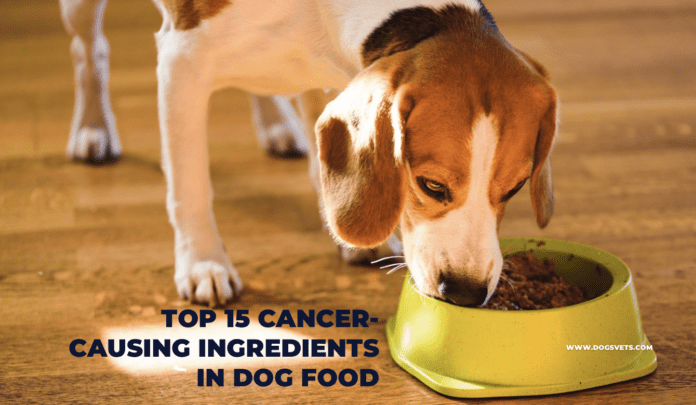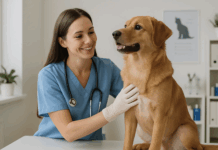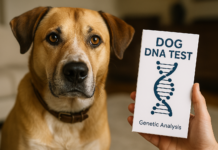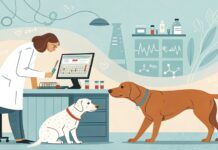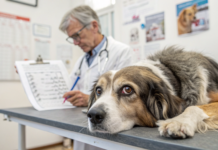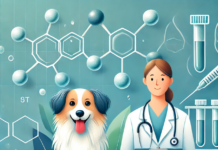Last Updated on April 12, 2023 by Dogs Vets
Top 15 Cancer-Causing Ingredients in Dog Food: What to Avoid for Your Pet’s Health”
As pet owners, we always strive to provide the best care for our beloved furry companions.
One of the most crucial aspects of maintaining their health and well-being is ensuring they receive a balanced and nutritious diet.
Regrettably, a significant number of commercial dog foods on the market contain ingredients that can be detrimental to our pets’ health, potentially leading to severe health issues, including cancer.
In this comprehensive guide, we’ll delve deep into the world of pet nutrition and identify 15 harmful ingredients often found in dog foods that have been linked to cancer.
We’ll also discuss why these ingredients are harmful, how they can negatively impact your dog’s health, and provide guidance on selecting healthier alternatives for your pet’s diet.
By being informed and making conscious choices, you can help protect your furry friend from the potential risks associated with these cancer-causing ingredients and promote a longer, healthier life for your canine companion.
1. Artificial Preservatives
Preservatives are used in dog foods to prolong shelf life and maintain freshness. However, some artificial preservatives have been linked to cancer.
These chemicals can cause oxidative stress, leading to cellular damage and potentially, cancer development. To keep your pet safe, opt for dog foods with natural preservatives like vitamin E and C.
2. BHA and BHT
Butylated hydroxyanisole (BHA) and butylated hydroxytoluene (BHT) are synthetic antioxidants used as preservatives in many dog foods.
Research suggests that these chemicals may be carcinogenic, especially when consumed in high amounts. Avoid dog foods containing BHA and BHT, and instead look for products with natural antioxidants like tocopherols.
3. Ethoxyquin
Ethoxyquin is another synthetic antioxidant used in pet foods to prevent fat spoilage. It has been associated with liver damage, kidney damage, and cancer in laboratory animals. Though its use in dog foods is regulated, it’s still best to avoid products containing this potentially harmful ingredient.
4. Artificial Colors and Dyes
Artificial colors and dyes are added to dog foods to make them more visually appealing. However, some of these chemicals have been linked to cancer and other health issues.
For example, Red 40, Yellow 5, and Yellow 6 have all been associated with potential carcinogenic effects. Choose dog foods that use natural coloring agents or have no added colors.
5. Propylene Glycol
Propylene glycol is a synthetic compound used in dog foods as a humectant to maintain moisture. Although it is generally considered safe, propylene glycol has been associated with an increased risk of developing certain types of cancer. Look for dog foods that use natural humectants like glycerin instead.
6. Rendered Meat
Rendered meat is a common ingredient in many dog foods, and it refers to the process of grinding and cooking animal by-products to extract proteins and fats.
This process can produce harmful substances like heterocyclic amines, which have been linked to cancer. Opt for dog foods that use high-quality, whole protein sources instead of rendered meat.
7. By-products
By-products are the leftover parts of animals that are not suitable for human consumption. They can include organs, bones, and even diseased or dying animals. These ingredients can be contaminated with harmful substances like aflatoxins, which have been linked to liver cancer in dogs. Choose dog foods that use clearly labeled, high-quality protein sources and avoid those containing by-products.
8. Corn, Wheat, and Soy
Many dog foods contain large amounts of corn, wheat, or soy as filler ingredients.
These grains can be contaminated with pesticides, such as glyphosate, which has been classified as a probable human carcinogen.
Additionally, some dogs may have allergies or sensitivities to these ingredients, which can lead to inflammation and increased cancer risk. Look for dog foods that use alternative grains or grain-free formulas.
9. MSG
Monosodium glutamate (MSG) is a flavor enhancer that can be found in some dog foods. While it is considered safe for human consumption, MSG has been linked to an increased risk of obesity, which is a known risk factor for cancer in dogs.
Avoid dog foods that contain MSG or its hidden sources, such as hydrolyzed vegetable protein or autolyzed yeast.
10. Nitrates and Nitrites
Nitrates and nitrites are preservatives often found in processed meats, including some dog food products. When consumed, these chemicals can form carcinogenic nitrosamines, increasing the risk of cancer. Choose dog foods that do not contain nitrates or nitrites, or opt for natural preservatives like vitamin E or C.
11. Carrageenan
Carrageenan is a thickening agent derived from seaweed that can be found in some wet dog foods. While it is considered safe for human consumption, there is some evidence that degraded carrageenan may cause inflammation and increase the risk of cancer in animals. To be on the safe side, avoid dog foods containing carrageenan.
12. Xylitol
Xylitol is a sugar substitute commonly found in sugar-free products, and it can be toxic to dogs. While it is not directly linked to cancer, xylitol can cause rapid insulin release, leading to hypoglycemia, seizures, and even death. Always check the ingredients list and avoid feeding your dog any products containing xylitol.
13. Chemically Treated Grains
Some dog foods may contain grains that have been treated with chemicals, such as pesticides or fungicides. These chemicals can leave residues on the grains, which can then be ingested by your dog. Exposure to these chemicals may increase the risk of cancer in dogs. Choose dog foods made with organic or untreated grains whenever possible.
14. High Sodium Content
Excessive sodium intake can lead to high blood pressure, heart disease, and an increased risk of cancer in dogs. Avoid dog foods with high sodium content, and be mindful of the treats you give your dog as they can also be high in sodium. Opt for low-sodium dog foods and treats to reduce your pet’s risk of developing health issues related to high sodium intake.
15. Added Sugars
Added sugars in dog foods serve no nutritional purpose and can contribute to obesity, which is a known risk factor for cancer in dogs. Look for dog foods without added sugars or those that use natural sweeteners, such as honey or molasses, in moderation.
Conclusion
Being aware of the ingredients in your dog’s food is essential to ensure their overall health and well-being. By avoiding dog foods containing these cancer-causing ingredients, you can help reduce your pet’s risk of developing cancer and other health issues.
Always read the ingredients list and choose high-quality dog foods made with natural, wholesome ingredients to provide the best possible nutrition for your furry friend.
FAQs
Q: What are some natural preservatives that are safe for dogs?
A: Some natural preservatives that are safe for dogs include vitamin E (tocopherols), vitamin C (ascorbic acid), and rosemary extract.
Q: How can I ensure that the grains in my dog’s food are not chemically treated?
A: Look for dog foods that use organic grains or those that specifically mention being untreated or pesticide-free.
Q: What are some alternative protein sources to avoid by-products and rendered meats?
A: High-quality protein sources include whole meats, such as chicken, beef, or fish, as well as meat meals made from these whole meats. Additionally, plant-based protein sources like peas and lentils can also be a healthy option for dogs.
Q: How can I determine if a dog food contains harmful artificial colors or dyes?
A: Check the ingredients list for any mention of artificial colors, such as Red 40, Yellow 5, or Yellow 6, and avoid products that contain these additives.
Q: Are grain-free dog foods always a better option for preventing cancer?
A: Grain-free dog foods can be a good option for dogs with allergies or sensitivities to grains, but they are not inherently better at preventing cancer. It’s essential to choose a high-quality dog food that uses wholesome ingredients, whether it’s grain-free or not.
Q: Can I still give my dog treats if I’m concerned about their diet and cancer risk?
A: Yes, you can still give your dog treats, but be mindful of the ingredients and choose treats made with natural, high-quality ingredients. Avoid treats with added sugars, artificial colors, and high sodium content.
Q: What other factors can contribute to cancer risk in dogs?
A: In addition to diet, factors such as genetics, exposure to environmental toxins, obesity, and age can all contribute to cancer risk in dogs. Regular veterinary check-ups, a balanced diet, and maintaining a healthy weight can help reduce your dog’s risk of developing cancer.
Fact Check
We hope you enjoyed reading this article. What are your thoughts on the topic?
“At [Dogsvets.com], our goal is to bring you the most accurate and up-to-date information on all things pet-related.
If you have any additional insights or would like to advertise with us, don’t hesitate to get in touch.
If you notice any errors or discrepancies in our content, please let us know so we can correct them.
We welcome your feedback and encourage you to share this article with others.”
